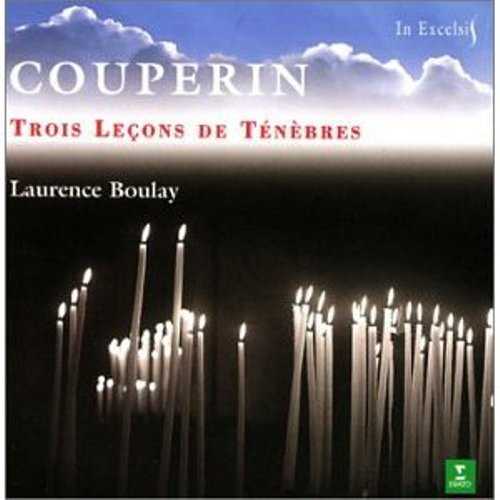
Composer: Francois Couperin
Performer: Mieke Van der Sluis, Guillemette Laurens, Pascal Monteilhet, Marianne Muller, Laurence Boulay
Audio CD
Number of Discs:
Format: FLAC (image+cue)
Label: Erato
Size: 235 MB
Recovery: +3%
Scan: no
01. Leçons de Ténèbres, for treble voice (or 2 treble voices) & continuo: No 03
02. Leçons de Ténèbres, for treble voice (or 2 treble voices) & continuo: No 01
03. Motet pour le jour de Pâques (‘Victoria: Christo resurgenti’), for 2 soprano & continuo
04. Leçons de Ténèbres, for treble voice (or 2 treble voices) & continuo: No 02
05. Magnificat, motet for 2 sopranos & continuo
Beyond galanterie
The music of François Couperin is generally admired for its galanterie: fancifulness, charm, profligacy of invention, and breadth of imagination. That he could be and was something more than a good-time Charlie is overlooked by many and unknown to others. The two so-called organ masses he composed–the one for parish use, the other for the cloister–give an excellent picture of the un-galant Couperin. Yet the three principal pieces of music on this CD–the Leçons de Ténèbres, written for performance by nuns of a convent near Paris on the Wednesday of Holy Week–are perhaps the finest introduction to Couperin’s sacred music. Many consider these three psalm settings Couperin’s greatest music, even the greatest of the entire French baroque. That the other two works on this CD are quite as fine is virtually all that needs saying about them. In addition, they demonstrate that Couperin’s unmistakable musical language could image the joy of the Resurrection as successfully as the affliction, dolor, and penitence of Spy Wednesday.
The lessons have been the subject of numerous recordings, many of them very fine. Those led by William Christie and Christophe Rousset, especially, have received wide praise, which I largely second. Despite their many virtues, however, I think that the finest performance, the most beautifully sung and paced and easily the most liturgical-sounding, is the present one: an Erato release with Mieke van der Sluis, Guillemette Laurens, and the late Laurence Boulay. The edition I own comes with full texts and informative notes by Mme. Boulay, who was a renowned scholar of this repertory. Whether this re-release has the same materials is unknown to me.
In closing, it is worth noting that this music has had enlightened advocacy for many, many decades and from several of the greatest artists of the twentieth century. Alfred Deller recorded the lessons twice, but as fine as they are, I recommend his recordings only to fellow Deller devotees. Dietrich Fischer-Dieskau also recorded the first lesson (1963); his realization of the style is superb albeit somewhat dated (changes in women’s fashions are nothing compared to those in baroque performance practice). The true enjoyment-limiting factor in DFD’s recording is the pedestrian clavecinist. Both men, however, are singing music written to be sung by nuns, and even though awareness of this fact need not determine an individual’s response, it’s hard to imagine anyone preferring male to female executants.